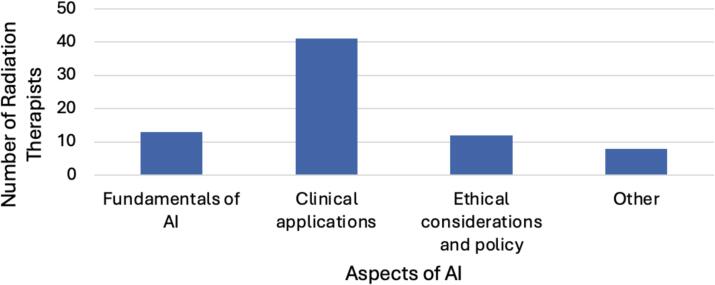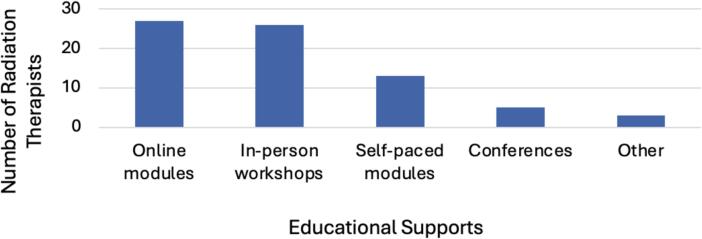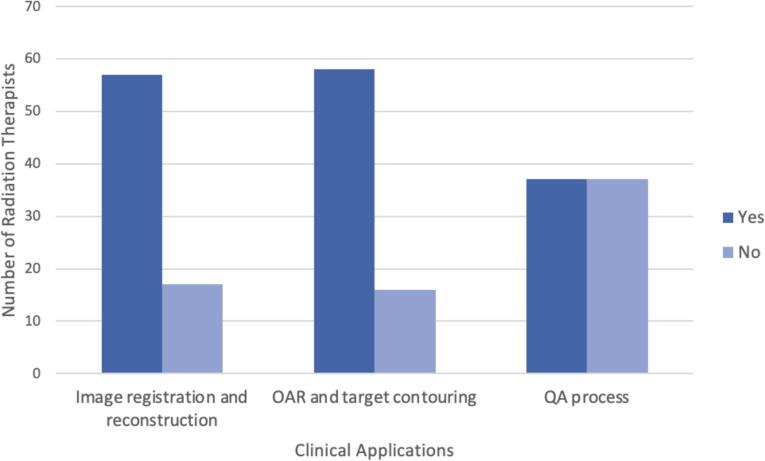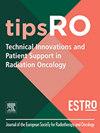Radiation therapists’ perspectives on artificial intelligence: Insights from a single institution on Improving effectiveness and educational supports
IF 2.8
Q1 Nursing
Technical Innovations and Patient Support in Radiation Oncology
Pub Date : 2025-01-05
DOI:10.1016/j.tipsro.2025.100300
引用次数: 0
Abstract
Introduction
In recent years, artificial intelligence (AI) technology has played an evolving role in radiation science, influencing the clinical practice of radiation therapists. This study aimed to explore the knowledge, attitude, clinical applications, and learning needs from the perspective of radiation therapists.
Materials and Methods
This study used a cross-sectional online survey with a population of radiation therapists from a single institution. The survey was developed iteratively and was based on past literature. The questions were constructed to measure perception using four themes: knowledge of AI, perceived utilization, job impact, clinical applications, learning needs, and educational support. The data was analyzed using descriptive statistics according to the key themes.
Results
Between 22nd December 2023 and 17th January 2024, 74 radiation therapists completed the survey. The majority (55.4 %) were 44 years or older (Baby Boomers and Generation X). Additionally, 37.8 % rated their knowledge of AI as none or limited, but 93.2 % expressed interest in learning more about AI. Many (79.7 %) perceived AI not to be fully used in radiation therapy but has increased its effectiveness in image registration, reconstruction, and contouring. With the increasing use of AI in healthcare, 96.0 % feel that AI may affect their role, and 82.4 % believe it may impact their job satisfaction. Educational supports indicated to be the most advantageous for their job were online modules (36.5 %) and in-person workshops (35.1 %).
Conclusion
Exploring the perspectives of radiation therapists has shown a strong interest in learning about AI and its role in radiation therapy. This information can help in understanding how to develop tailored strategies to mitigate potential barriers, leading to the successful implementation of AI in clinical radiation therapy practice.



放射治疗师对人工智能的看法:来自单一机构对提高有效性和教育支持的见解。
导读:近年来,人工智能(AI)技术在放射科学中发挥着不断发展的作用,影响着放射治疗师的临床实践。本研究旨在探讨放射治疗师的知识、态度、临床应用和学习需求。材料和方法:本研究对来自单一机构的放射治疗师进行了横断面在线调查。这项调查是根据过去的文献反复进行的。这些问题是通过四个主题来衡量感知的:人工智能知识、感知利用、工作影响、临床应用、学习需求和教育支持。根据关键主题,采用描述性统计方法对数据进行分析。结果:在2023年12月22日至2024年1月17日期间,74名放射治疗师完成了调查。大多数人(55.4%)年龄在44岁或以上(婴儿潮一代和X一代)。此外,37.8%的人认为他们对人工智能一无所知或了解有限,但93.2%的人表示有兴趣更多地了解人工智能。许多人(79.7%)认为人工智能并没有完全用于放射治疗,但它在图像配准、重建和轮廓方面的有效性有所提高。随着人工智能在医疗保健领域的应用越来越多,96.0%的人认为人工智能可能会影响他们的角色,82.4%的人认为人工智能可能会影响他们的工作满意度。对他们的工作最有利的教育支持是在线模块(36.5%)和面对面的研讨会(35.1%)。结论:探索放射治疗师的观点显示出对学习人工智能及其在放射治疗中的作用的强烈兴趣。这些信息有助于了解如何制定量身定制的策略来减轻潜在的障碍,从而在临床放射治疗实践中成功实施人工智能。
本文章由计算机程序翻译,如有差异,请以英文原文为准。
求助全文
约1分钟内获得全文
求助全文
来源期刊

Technical Innovations and Patient Support in Radiation Oncology
Nursing-Oncology (nursing)
CiteScore
4.10
自引率
0.00%
发文量
48
审稿时长
67 days
 求助内容:
求助内容: 应助结果提醒方式:
应助结果提醒方式:


